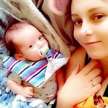The Truth About Postpartum Depression: From a New Mom
Debunking the Postpartum Depression Stigma

The "Bad Mom" Stigma
"Postpartum Depression," the F-bomb of the mom world until now, also known as P.P.D. Did you know, suicide is the second leading cause of death in Postpartum women? "Suicide," yet another taboo word when talking about depression after birth. Suicidal thoughts and thoughts of self harm are a side effect of depression, and it does not make you a bad mother to admit that you suffer from them. "Bad mom" stigma can be a deterrent for getting help to avoid judgement from uninformed family and peers. I'm here to tell you from experience that seeking help from a medical professional makes you no less a mother than any other mother. Finding treatment allows you to soak up that precious time with the baby without the worry of depression or anxiety.
For me, Postpartum Depression set in before the birth of my son July 19, 2018 in the form of harsh, depressive episodes accompanied by suicidal thoughts. After his birth it continued in the form of sweat drenched, heart racing panic attacks the second I woke up. The panic attacks caused hallucinations that my son was somewhere under the blankets, suffocating. My brain could not comprehend that it was all in my head, I was sure that I'd fall asleep during a feeding and he'd get hurt in the bed. This brought the onset of guilt and even more sleepless nights.
I felt I was failing as a mother, and as a wife. It worsened to the point that it had my marriage in a tailspin and sleep was maybe 2 hours a night. Then came my depression. As the excitement and adrenaline of becoming a new mother wore off, exhaustion set in and so did depression. I became a recluse. I began denying help from family because I felt I was taking too long to recover. I thought I couldn't properly "entertain" guests without a spotless home and a full face of makeup. Many days if my depression wasn't stopping me from taking a moment to get dressed and practice a little self-care, a colicky baby was. I felt unfamiliar in my new body, I felt like less of a woman because I didn't have my household clean, dinner made, the baby peacefully asleep, and a good TV show on cuddled up next to hubby. Realistically, my floors were a mess, dinner was a microwaved hot dog with chips, the baby was screaming from colic, and hubby was nodding off on the couch exhausted from work. Combine this with the struggles of breastfeeding while losing milk supply and you've got one off-her-rocker mama.
For the record, whoever said, "No crying over spilled milk," has never breastfed before. The truth in all of it? The dishes will get done, the floors will get mopped, the laundry will get folded and things will mellow out. It is going to take time and patience. But imagine in the middle of it all you break your leg. What? Hear me out. You're going to go to the doctor and get it fixed, thats the logical thing to do right? So why would you not do the same when your mental health has you miserable, missing all the little moments, unable to enjoy the most basic of activities? Depression can be just as debilitating as any illness or broken bone and should be treated by a medical professional just the same.
The first mistake I made was isolating myself. I passed by women who scoffed at me after looking me up and down. I believed this was because I was failing to be presentable and have it all together and not just because they were insecure within themselves and seeking validation. I thought, as many mothers do, that I was weak for not being able to keep it together so I plastered on a smile, smudged on some makeup and pretended I was fine. This is all too common for mothers going through what I went through. So believe me when I say, the most important thing in your Postpartum journey is that you do not isolate yourself from help. Support it is out there. I've chosen to break my silence to break the stigma around Postpartum Depression and raise awareness so my daughter can one day seek help she needs and deserves without being passed unfair judgement. The world is evolving and with it, awareness of just how serious and common depression and anxiety are.
So what do you do now?
What do you do when you start to feel that little black cloud forming or hear the looming voice in the background telling you all that could go wrong with baby? First and foremost, call your doctor. Any doctor, whether its your primary care doctor, your OBGYN or midwife, support is going to be your best tool here. From there you can build a treatment plan that is best for you. It is important to address this as soon as possible because it CAN get worse and not having trusted people aware of this can make you feel even more alone with your thoughts and therefore, worsen the problem. You are not weak for seeking help so stop thinking that right now. You are a human being with complex emotions and right now you are healing, sleep-deprived, hormone flooded and feeling far less than sexy, even with the mesh undies. Its natural to not feel on top of the world Momma and you're not alone. There are Postpartum support groups on social medias and locally just about everywhere, with other new mothers experiencing P.P.D that you can speak, relate, and find healing with.
The Facts
Did you know, according to the American Psychological Association 1 in 7 women experience Postpartum Depression and/or anxiety? Symptoms of Postpartum Depression range from sadness, sleeplessness (Yep! even more sleepless than your nights already are), loss of pleasure or interest in things you used to enjoy (including sex), Eating more, or less, than usual, anxiety, panic attacks, Feeling guilty or worthless, and more. If you or a loved one suspects that you may be experiencing P.P.D you can find more information, symptoms, and contacts at APA.ORG under "Postpartum Depression."
If you have any questions or would like to share your experience feel free to email me at [email protected]
Works Cited:
2018 American Psychological Association "Postpartum Depression"
Kate Rope "New Study Reveals Disturbing PPD Statistics: EXPERTS RECOMMEND UNIVERSAL SCREENING FOR POSTPARTUM DEPRESSION" SELENI INSTITUTE






Comments
There are no comments for this story
Be the first to respond and start the conversation.